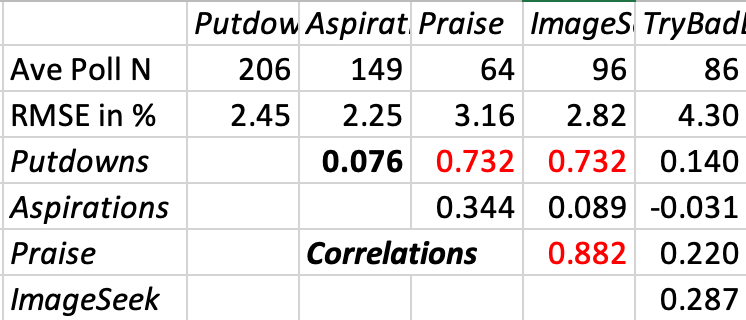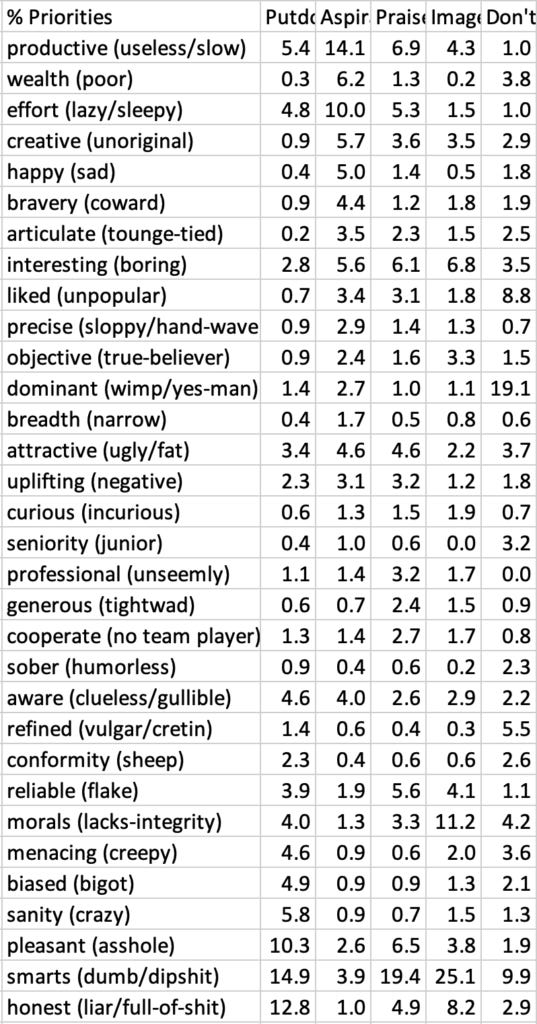Honest Putdowns
What do people want? Surely one thing they want is to not be insulted or put down by others. Yet if you ask people what personal features they most aspire to improve, the features they pick have no correlation with the features used in the putdowns around them! Yet putdown features have strong correlations with the features used in praise, and with the features people say they care most what others think of them. In this post, I’ll describe and interpret these new results, concluding that putdowns are our best guide to what really counts for status; aspirations are deluded, and not to be trusted.
So let’s start. Recently on Twitter I asked people for the damning descriptors that most lower folks’ status in their world. I then collect 32 such putdowns, identified the key human feature to which each referred, and then taxed the patience of my Twitter followers by posting five sets of 24 polls, with each poll comparing four of these 32 features. (Each feature appears in exactly 3 polls in each set.)
Each poll set corresponds to a different choice criteria. For the first criteria, Putdowns, I asked which feature was most often used for putdowns in their world. The next three criteria are: Praise asks which feature is most used for praise or admiration, Aspirations asks which you most aspire to improve in yourself, and ImageSeek asks for which you care most what others think of you. The last criteria TryLookBad asks for which feature (e.g., fart rate) it is most plausibly has an issue of it looking bad to try hard.
For each criteria, I fit (via min squared error) poll % responses to a simple model wherein some % of responses are random, and the rest are in proportion to the relative (positive) “priority” of each feature. The following table shows, for each criteria, the average number of responses per poll (Ave Poll N), the average root mean square error (RMSE in %) of its model in estimating poll % responses, and correlations between its prioritizes and priorities of other criteria. The correlations in red have t-stats of over 4.

Note that TryBadLook seems to have just failed as a poll question, with large errors and weak correlations; many just misunderstood it. Praise and ImageSeek are quite strongly correlated with each other and are similarly correlated with Putdowns, though only Praise is weakly correlated (t-stat 1.37) with Aspirations.
The most striking result, shown in bold, is that priorities for Putdowns and Aspirations are uncorrelated! You might think that since people don’t like to be insulted, they’d aspire more to look better on vulnerable features. But no. To help explore this puzzle, here are the best fit relative priorities for all 32 features and five questions, sorted by the difference between Aspirations and Putdowns priorities. (The % priorities for each criteria add to 100%.)

The pro-Aspiration top of the list has features like wealth, creative, brave, and articulate, that impress observers even if observers don’t value them as much. And it has features like productive and effort, which we’d like to convince others are a high priority for us. I do not at all believe that these two features are actually most people’s highest priority for improvement.
At the pro-Putdowns bottom of the list are features like menacing, biased, sanity, pleasant, and honest, which people see as important in others but not worth of improving in themselves. Plausibly, people convince others that they are not the type of folks at risk of ranking poorly on such features, so there is little need to work at them. Or, admitting that they are working on them would admit they have problems with them. It seems that people are also reluctant to admit they might have a problem with insufficient smarts.
In the middle of the list are features, like breadth, curious, professional, and generous, that most people pretend to care more about than they actually do. They are neither damning enough to be worth more putdowns, nor valued enough to be worth more aspiration. Note that features like liked and attractive plausibly matter less in putdowns because audiences for putdowns don’t like to admit that they care about them as much as they do. Not also that in another poll, respondents said 3-to-1 that criticism influences reputations more than does praise, with a majority saying it does so far more.
As these interpretations of the Putdowns–Aspirations differences mostly blame Aspirations for being less than honest, I conclude that the priorities of Putdowns are a more accurate measure of the true determinants of status than are the other measures above. Praise and ImageSeek are closer than Aspirations, but they are also polluted, Praise by the tendency to flatter people on the features on they want to be praised, and ImageSeek by our delusions regarding what failures are plausible for us.
Putdowns show what features really determine status, and aspirations can’t be trusted, as we care a lot more about status than we care to admit.
Yes of course it would be nice to check that these results hold for larger poll pools, and to see how they might vary with different subcultures.


It's a pity that the TryLookBad was basically useless as an instrument- I think that it might have had some bearing on "honesty" as a variable- it's an extremely common putdown, extremely status-impacting, and it's something that (I think) myself and a lot of people struggle with and would like to improve in ourselves- but admitting so seems very low-status, since it means admitting you aren't perfectly honest already!
Which is of course why that word is almost never interpreted literally.